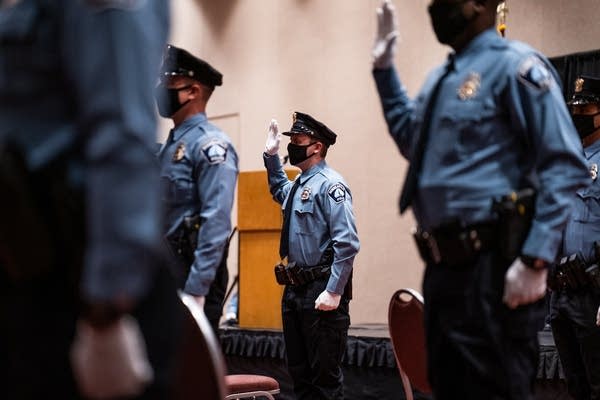After George Floyd, some cities gained ground in police contract negotiations
Many argue Minneapolis was not one of them

Go Deeper.
Create an account or log in to save stories.
Like this?
Thanks for liking this story! We have added it to a list of your favorite stories.
Like several cities in the United States, Minneapolis has a fresh police contract — its first since the murder of George Floyd. Many had hoped Floyd's death and the uprising that followed would lead to significant reform, whether through policy in the halls of government or concessions at the bargaining table.
In Minneapolis, Javier Morillo argues they did not.
“It’s just stunning that a new contract was negotiated and finalized and then approved by the city council that includes absolutely zero changes to the disciplinary process,” he said. “And in a city and state that is the home of a global reckoning on race in the aftermath of that horrific tragedy, it does boggle the mind.”
Morillo is a fellow at the Rutgers Center for Innovation in Worker Organization and a past president of SEIU Local 26, which represents commercial building workers in the Twin Cities metro area.
Turn Up Your Support
MPR News helps you turn down the noise and build shared understanding. Turn up your support for this public resource and keep trusted journalism accessible to all.
The city’s new contract does give the police chief more discretion in reassigning officers who are involved in incidents where an officer or civilian is killed or seriously harmed. It also strengthens mental health screening requirements for those officers. But Mayor Jacob Frey said he’d prefer to reform the discipline process in ways that don’t need to be negotiated with the union.
But outside of Minneapolis, police unions have bent on discipline issues. That’s according to Ron DeLord, a former police officer and labor attorney who literally wrote the playbook that helped police unions gain power nationwide. DeLord said all of the contracts he’s negotiated since 2020 have included changes to officer discipline and improved transparency.
“But we’re not going ever to reach a stage where 100 percent of police are convicted of a crime when they’re involved in a critical incident, because that’s not realistic and that’s not due process,” DeLord said. “I look to work on, not what people on the outside are screaming is justice, but what justice really should be.”
Both DeLord and Morillo joined MPR News host Tom Crann on Monday to talk about the role police unions play in public safety reform. To hear both perspectives, click play on the audio player above.


